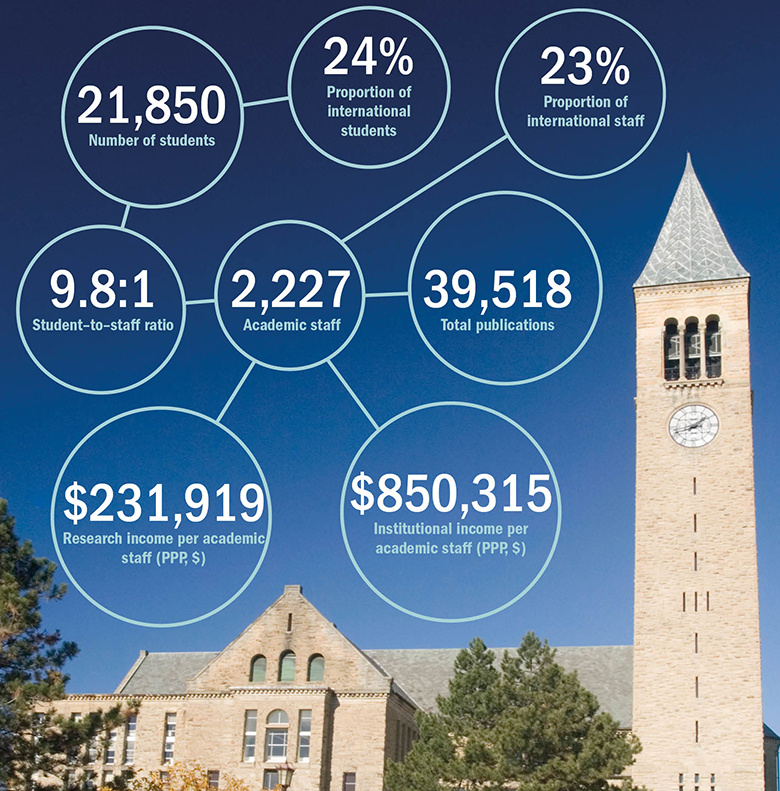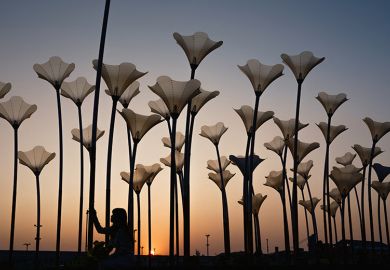Browse the full results of the World University Rankings 2018
In an essay written to commemorate Cornell’s 75th anniversary in 1940, the distinguished historian Carl Becker gave this perspective on the purpose of universities: “There is…no reason for the existence of Cornell, or of any university…except in so far as they serve to maintain and promote the humane and rational values which are essential to the preservation of democratic society, and of civilization as we understand it.”
He went on to enumerate those values, noting in particular that “to know what is true is a primary value upon which in the long run all other values depend”.
At the time Becker wrote these words, unspeakable actions were occurring in the world. It was arguably the moment in the 20th century at which democratic society was most threatened. Today, we face different challenges, but there is no less of a call on universities to “maintain and promote the humane and rational values” that preserve democratic society.
Of course, the primary way in which universities meet this call is through our core work of research and education: research in which we discover, curate and preserve knowledge of what is true; and education in which we convey that knowledge to our students. But there is an interlinked triad of additional responsibilities that universities must satisfy.
World University Rankings 2018: results announced
They begin with an obligation to stand up for the very notion of knowledge and truth. Over the past decade, we have seen a growing public disregard for evidence in shaping both individual beliefs and public policy, a disregard that threatens the coherence of democracy. We have become, as a society, sloppy in assessing information, too frequently willing to conclude that something is true – or false – on the basis of hearsay, without rigorous examination of evidence.
There are many reasons for this: the glut of information that we encounter daily, which makes it taxing to discern what is accurate; the degree to which social media facilitate the seemingly endless repetition of unsubstantiated assertions until they take on the aura of truth; and the complexity of the modern world, which sometimes requires highly specialised understanding.
We cannot know everything, but as many others have noted, not knowing everything does not mean that we know nothing. That there are competing hypotheses does not mean that on balance the evidence does not point to one as the most likely. That there may be multiple interpretations of an event does not mean that some are not better justified than others.
Cornell University

As institutions committed to the value of knowing what is true, universities must forcefully and publicly defend the notions of evidence, reason and truth, and we must be intentional in providing both our students and the public with the tools needed to assess evidence and determine the reliability of information.
Our second responsibility is to defend free expression. Without an ability to hear all ideas and to question all statements, we cannot come to know what is true. The physicist Edwin Hubble observed that science progresses through successive approximations of the truth. In fact, that is the case for understanding more broadly. Yet we can have successive approximations of truth only if we allow statements that are at odds with the currently understood approximation. As universities – institutions whose very mission is tied to the free interchange of ideas – we have a special responsibility to be open to all thought.
On campuses today, there is significant debate about the borders of free speech. When faced with speech that is obnoxious, offensive, even hateful, we must remember what history has shown about the perils associated with suppressing speech: that so often it is the powerful majorities who suppress the speech of the less powerful – from abolitionists, to suffragettes, to labour organisers, to civil rights activists.
This does not imply that there are no limits to speech. Threats and conduct that incites imminent violence are not protected under the Constitution of the United States, nor would we tolerate such actions on our campuses. Persistent harassment that targets an individual, or behaviour that reasonably is deemed to disrupt university activities is also unacceptable.
Download a copy of the World University Rankings 2018 digital supplement
The lines are messy, and debate about them is an appropriate and healthy activity for our universities. But our first instinct must be to protect freedom of speech. While there are those who may promulgate messages that we collectively and institutionally abhor, we cannot allow them to push us into curtailing the rights that we cherish. Instead, it is our duty to use those rights to identify and confront evil, to educate, and to vigorously support, empower and defend the dignity of those who are targeted by abhorrent speech.
This leads to higher education’s third civic responsibility: to work for a future in which all groups are fully included in the conversation, and to create campuses that are truly diverse, inclusive and egalitarian. Multiple imperatives underlie this responsibility: our knowledge, backed by research, that learning is enhanced in diverse settings and that diverse perspectives lead to better solutions to problems; the stresses in democratic society that will be addressed only by an increased ability to work across difference; and the moral imperative of equality that is fundamental to democracy.
An openness to all students is embedded in Cornell’s ethos, which was founded as a university for “any student”, without regard to race, gender or nationality. But even with its deep commitment to egalitarianism, Cornell has not always been successful in realising this value. The work must continue, to create a culture in which all members of our community feel that they belong, can do their best work and can learn from one other.
Today, as much as ever, we in universities must take seriously our responsibilities to help preserve democratic society – not only through distinguished research and thoughtful, innovative teaching, but also by doing the difficult yet essential work required to fulfil our civic responsibilities.
Martha Pollack is president of Cornell University.
Register to continue
Why register?
- Registration is free and only takes a moment
- Once registered, you can read 3 articles a month
- Sign up for our newsletter
Subscribe
Or subscribe for unlimited access to:
- Unlimited access to news, views, insights & reviews
- Digital editions
- Digital access to THE’s university and college rankings analysis
Already registered or a current subscriber?








